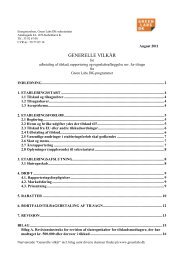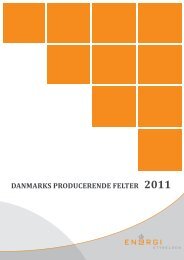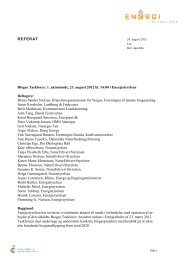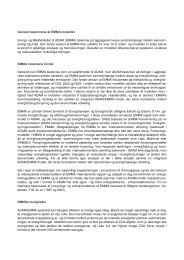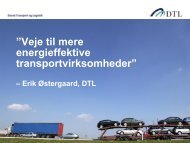Energy Strategy 2050 – from coal, oil and gas
Energy Strategy 2050 – from coal, oil and gas
Energy Strategy 2050 – from coal, oil and gas
Create successful ePaper yourself
Turn your PDF publications into a flip-book with our unique Google optimized e-Paper software.
A fully financed transition<br />
Figure 5.1 Financing the government’s proposal<br />
A fully financed package of initiatives<br />
The government’s new climate <strong>and</strong> energy policy<br />
initiatives up to 2020 are fully financed. This also applies<br />
to tax revenue losses resulting <strong>from</strong> lower energy<br />
consumption <strong>and</strong> in particular lower consumption of<br />
fossil fuels. This implies, that the transition to fossil fuel<br />
independence will primarily be financed by the energy<br />
consumers, who will also reap advantages in the form of<br />
lower fuel costs <strong>and</strong> better security of supply.<br />
58<br />
Increased energy efficiency in<br />
buildings <strong>and</strong> businesses<br />
Estimated at<br />
DKK 0.6 billion in 2020<br />
New initiatives for renewable<br />
energy expansion<br />
Estimated at<br />
DKK 1.4 billion in 2020<br />
State revenue losses due<br />
to reduced consumption<br />
of fossil fuels<br />
Estimated at<br />
DKK 1.6 billion in 2020<br />
Other new initiatives<br />
Estimated at DKK 0.2 billion<br />
over the period 2011-2014<br />
<strong>Energy</strong> <strong>Strategy</strong> <strong>2050</strong> <strong>–</strong> <strong>from</strong> <strong>coal</strong>, <strong>oil</strong> <strong>and</strong> <strong>gas</strong> to green energy.<br />
Financed through energy company<br />
tariffs <strong>and</strong> thus by energy consumers<br />
(electricity, heating, <strong>oil</strong>, <strong>gas</strong>).<br />
Financed primarily through the Public<br />
Service Obligation (PSO), which is charged<br />
over the electricity bill. In addition, a new<br />
<strong>gas</strong> PSO scheme will be introduced<br />
<strong>and</strong> charged over the <strong>gas</strong> bill.<br />
Financed through the introduction of a<br />
security of supply tax which will contribute<br />
to a revenue-neutral green transition.<br />
Financed by re-allocating existing funds<br />
in the energy <strong>and</strong> climate budget,<br />
including remaining funds <strong>from</strong> the existing<br />
scheme for scrapping <strong>oil</strong> furnaces.<br />
Financing energy saving initiatives through grid<br />
tariffs <strong>and</strong> energy consumers<br />
The costs of energy companies relating to energy saving<br />
initiatives are covered through the companies’ grid<br />
tariffs, <strong>and</strong> thus ultimately paid by energy consumers.<br />
The grid tariffs are subject to financial regulation set in<br />
advance. The regulation is implemented by executive order<br />
following political negotiations. If the increases in the<br />
obligations are distributed proportionately on the basis<br />
of current consumption, the higher costs will be more or<br />
less equally distributed between electricity consumers,<br />
district heating consumers <strong>and</strong> <strong>oil</strong> <strong>and</strong> <strong>gas</strong> customers.



